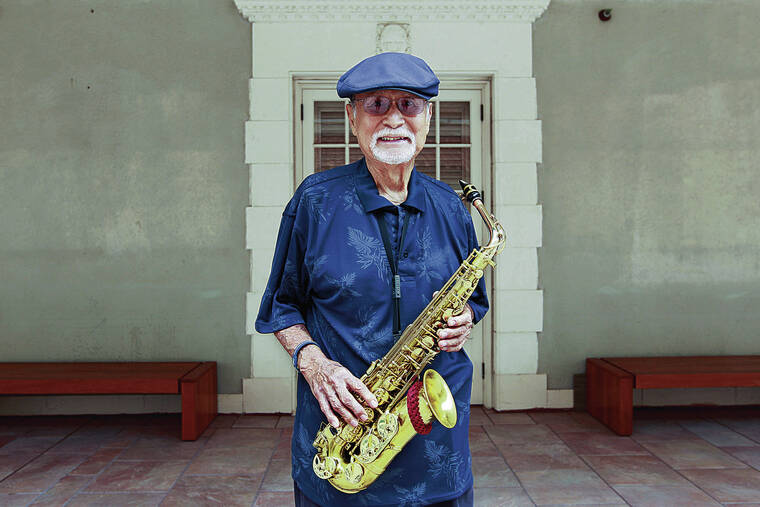Gabe Baltazar, the greatest Hawaii-born jazz musician of his generation — known internationally for his work with bandleader Stan Kenton in the 1960s — died Sunday at his home in Waialua. Baltazar had been in declining health for several years. He was 92.
“They cared for him at home for the past six or seven months,” Baltazar’s younger brother, Ronald, said Tuesday, referring to Baltazar’s decision to spend his last months at home instead of in hospice care. “They felt it was better for him to be in the home where he lived. His stepdaughter-in-law did all the taking care of him with the oxygen and whatever he needed. He had his own room and I’m sure he was happy. When I would visit him, he looked very content.”
Drummer Noel Okimoto remembered Baltazar’s kindness toward younger musicians like himself. Okimoto was in his midteens when Baltazar welcomed him to Sunday jam sessions at Kats-O, a jazz club in Kapalama, and later invited him to become a member of his regular band.
“He was such a wonderful person,” Okimoto said. “He was a man of few words; he didn’t give us much instruction. He let us play, and then every now and then he would say something to right the ship. We were young; we really didn’t know (jazz). We were influenced by other kinds of music other than jazz, and some of that would kind of creep into it, and he allowed it and he embraced it. He told us to bring the new stuff like jazz-rock or fusion stuff, and he’d teach us bebop and swing and all of that.”
Born Gabriel Ruiz Hiroshi Baltazar Jr. in Hilo, Baltazar took up the clarinet at age 11 and later switched to alto saxophone. At age 14 he started playing professionally for audiences in wartime Hawaii.
Baltazar graduated from McKinley High School in 1948 and continued his musical education at Peabody Conservatory in Baltimore. Drafted for military service in 1950, he served four years with the 356th Army Band at Fort Belvoir, Va., before returning to Hawaii. After a two-year stint with the Royal Hawaiian Band, Baltazar relocated to Los Angeles where he worked with bandleader Paul Togawa and studied music at Los Angeles State College.
It was in Los Angeles that he accepted an invitation to be lead alto sax in Kenton’s orchestra. Baltazar’s five years with Kenton earned him international fame as a top-class musician and recording artist. After leaving Kenton’s group he continued working as a recording artist in Los Angeles and in television orchestras for several NBC variety shows.
When Baltazar returned home to the islands as a permanent resident in 1969, he became the inspiration and mentor for a younger generation of musicians. First and foremost were Okimoto, Benny Rietveld, Carl Wakeland and Doug MacDonald, the quartet Baltazar assembled for a memorable full-time engagement at the Cavalier jazz club in the Pan Am Building.
Rietveld describes his years with Baltazar as “unbelievably great training.”
“I think he also taught us a little bit about comportment and carrying yourself as a cool human being,” Rietveld said Tuesday, calling from Los Angeles. “He was insanely talented … but he was always very local-boy chill, you know. He was never like, ‘This is the way to do it.’ By virtue of example, he taught us how to be better.”
“It was just a wonderful time,” Okimoto said of his years with Baltazar. “We were like 18, 19 years old and playing with the greatest jazz musician in Hawaii.”
Balthazar spent 16 years as a member of the Royal Hawaiian Band, retiring in 1985. The current members of the RHB Sax Quintet serenaded him on his last birthday, in November.
In 2007, Baltazar received the Hawai‘i Academy of Recording Arts Lifetime Achievement Award.
Baltazar is survived by brother Ronald, son, Scott, stepson Eugene D. Gold and stepdaughter-in-law Judy Gold, and nephews Delano “Volcano” Choy Jr. and David Choy.
Plans for funeral services and a celebration of life are pending.

